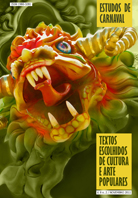THE CARNIVAL IN THE TRADITIONALIST PARADE: AN ETHNOGRAPHIC ACCOUNT OF THE CONSTRUCTION OF FLOATS for THE 2010 FARROUPILHA WEEK IN THE SHEDS OF PORTO SECO
DOI:
https://doi.org/10.12957/tecap.2011.10388Keywords:
TRADITIONAL CARNIVAL, IDENTITIES, SPECTACULARIZATION, RIO GRANDE DO SUL, FARROUPILHA WEEK.Abstract
This article investigates the process of building themed floats for the 2010 gaucho traditionalist parade in the sheds of the Complexo Cultural Porto Seco, place of the carnival parade in Porto Alegre. Based on Oliven's views (2006) on this state's regional identity, it examines the controversial relationship between traditionalism and carnival, developing thoughts on the building of identity of both parties. The process of 'spectacularizaton' of these events allows us to think of a review moment of these identity positions that once seemed unlinkable and binary. The analysis of the ways used in the production of the floats in the sheds of the samba schools and their ideas and representations of Farroupilha Week denounces the debate on the relationship and complementarity of the two cultures.Downloads
Published
2011-11-01
How to Cite
Duarte, U. C. (2011). THE CARNIVAL IN THE TRADITIONALIST PARADE: AN ETHNOGRAPHIC ACCOUNT OF THE CONSTRUCTION OF FLOATS for THE 2010 FARROUPILHA WEEK IN THE SHEDS OF PORTO SECO. Textos Escolhidos De Cultura E Arte Populares, 8(2). https://doi.org/10.12957/tecap.2011.10388
Issue
Section
Articles
License
Autores que publicam nesta revista concordam com os seguintes termos:- Autores mantém os direitos autorais e concedem à revista o direito de primeira publicação, com o trabalho simultaneamente licenciado sob a Licença Creative Commons Attribution que permite o compartilhamento do trabalho com reconhecimento da autoria e publicação inicial nesta revista.
- Autores têm autorização para assumir contratos adicionais separadamente, para distribuição não-exclusiva da versão do trabalho publicada nesta revista (ex.: publicar em repositório institucional ou como capítulo de livro), com reconhecimento de autoria e publicação inicial nesta revista.
- Autores têm permissão e são estimulados a publicar e distribuir seu trabalho online (ex.: em repositórios institucionais ou na sua página pessoal) a qualquer ponto antes ou durante o processo editorial, já que isso pode gerar alterações produtivas, bem como aumentar o impacto e a citação do trabalho publicado (Veja O Efeito do Acesso Livre).

